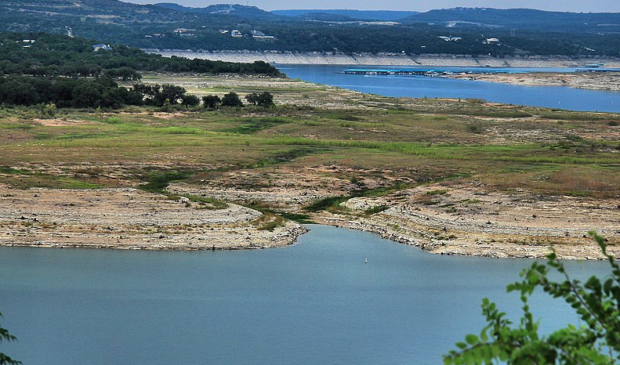Travis County calls on LCRA to ‘get serious’ about water conservation
Thursday, July 28, 2022 by
Seth Smalley The Travis County Commissioners Court unanimously approved a resolution July 19 requesting that the Lower Colorado River Authority accelerate a change to its Highland Lakes water management plan. If LCRA cooperates, a “more protective” approach would be implemented to reflect Central Texas’ shrinking water supply and substantially more arid conditions.
Commissioners took particular issue with LCRA’s selling of water from the reservoirs of Lake Buchanan and Lake Travis to regions with more water, despite its growing scarcity in Central Texas. The Highland Lakes are the primary water supply for Central Texas.
“The current LCRA water management plan is in need of modernization to reflect the region’s paradigm shift of increasing water needs and drier weather patterns,” the resolution stated. The resolution asserted that Central Texas is projected to add up to “1 million new residents by 2030,” further exacerbating the water shortage.
Suggested updates to the plan included provisions “that encourage conservation by all water users and prepare for greatly increased water demands.”
“Our region has to get much more serious about aggressive water conservation efforts and I just don’t see it happening,” said Commissioner Brigid Shea, who co-sponsored the resolution along with Commissioner Ann Howard. “So consider this resolution sounding the alarm.”
“I think it’s a good opportunity for us to pass this resolution and just encourage the LCRA to take a good look at what’s going on,” Howard said. “I was encouraged that the management plan they have did have a trigger that caused them not to sell a second round of water downstream for irrigation.”
Sustained drought conditions could become permanent in the region, according to state climatologist John Nielsen-Gammon. In 2020, his office predicted “megadroughts” occurring in Texas throughout the 21st century, causing reservoirs to dry and making the soil less capable of supporting agriculture.
“We are looking at the potential for an extreme shortage of water for drinking for our region and yet the LCRA continues to sell water to new users and continues to release water for a swamp-land crop,” Shea said. “Rice farming is flood farming. They’re literally flooding fields with water from an increasingly arid region.”
The resolution calls for LCRA to obtain information on the causes and effects of the decline in water in the region, and to assure “the implementation of modern and efficient water practices” related to irrigation in dry climates.
“The Achilles’ heel is LCRA’s unwillingness to recognize the science, acknowledge the true drought of record, which was 2011, and go in and redo their water availability model,” Shea said. “They are still operating as if it were 1942 and there is plenty of water for everyone.”
Photo by Larry D. Moore, CC BY-SA 3.0, via Wikimedia Commons.
The Austin Monitor’s work is made possible by donations from the community. Though our reporting covers donors from time to time, we are careful to keep business and editorial efforts separate while maintaining transparency. A complete list of donors is available here, and our code of ethics is explained here.
You're a community leader
And we’re honored you look to us for serious, in-depth news. You know a strong community needs local and dedicated watchdog reporting. We’re here for you and that won’t change. Now will you take the powerful next step and support our nonprofit news organization?









